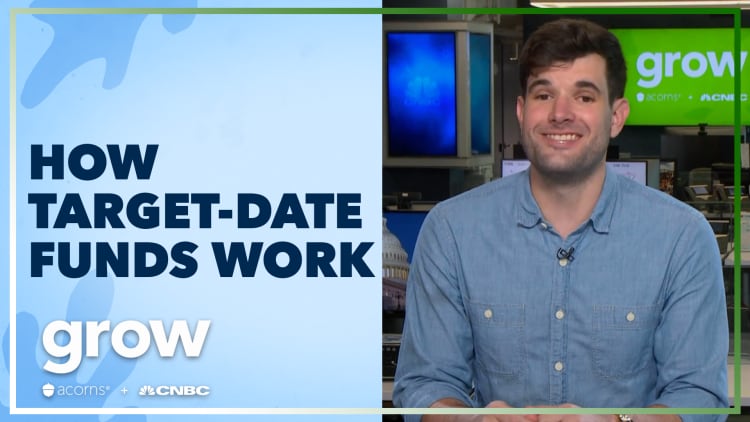Following the conventional wisdom can get you far in the investing world. That's because much of the advice for building a successful portfolio is based on rules that generally stay the same.
For example, investing enough to get a matching contribution from your employer in your 401(k) is a mathematical no-brainer because you essentially earn free money. And the earlier and more consistently you invest, the longer compound interest has to do its thing.
More from Grow:
3 predictions from investing experts on what could affect your 2022 portfolio
This ‘Jeopardy!’ investing question stumped all 3 contestants
Is there a ‘hidden bear market’? Knowing the answer can make you a better investor
But not everything in personal finance comes down to mathematical equations, and the state of the markets can force experts to rethink the thought process behind advice that was once considered to be tried-and-true.
Take the advice around how to invest in retirement. In the standard model followed by many financial advisors as well as the folks who manage target-date funds, the investors hold a majority of their portfolios in stocks when they're young before gradually shifting the bulk of their assets toward less-risky assets, such as bonds, up to and through their retirement.
For years, the strategy made sense. But with inflation on the rise and interest rate hikes on the horizon, that strategy doesn't look as attractive, says Brian Robinson, a certified financial planner at SharpePoint in Phoenix, Arizona.
"We're at an inflection point," he says. "People would use the old convention that you should take 100 or 90 minus your age, and that's how much you should have in equities, with the rest in fixed income. The data just doesn't support that anymore."
So what would financial advisors have you do? Opinions vary, but many say you'd be wise to plan on investing more in stocks throughout retirement. Here's how they say to do it.
How inflation and interest rates affect retirement planning
To understand why retirement calculations are shifting, it's important to take a look at how bonds behave.
Investors hold bonds for two reasons. One is to preserve capital. Because bond prices don't fluctuate as much as stock prices do, a portfolio of bonds is less susceptible to big drawdowns.
If you need to use money from your portfolio in short order, either because the money is earmarked for a short-term goal or because it's money you intend to live off of in retirement, that's a big deal. If you're about to retire or recently retired, a bearish downturn could derail your plans.
The other purpose is to provide income. Bonds provide interest payments that investors could theoretically use to supplement their income in retirement.

Video by Tala Hadavi
Lately, though, payments from bonds look pretty paltry. At last check, the yield on the 10-year U.S. Treasury (a benchmark rate for long-term bonds) stood at 1.78%.
"Right now inflation is at about 7%," says Robinson. "If you want your portfolio to keep up, something paying 1.8% isn't going to do it."
Wait, you may be thinking, aren't interest rates set to go up? The answer is likely yes, but that's not necessarily a good thing for bond holders either.
That's because bond prices and interest rates move in opposite directions, so each hike in interest rates eats into the principle of the bonds in investor portfolios.
Why advisors recommend upping your stock allocation in retirement
Given the current market conditions, planning to hold a majority of your retirement portfolio in bonds is a losing proposition, says Will Rhind, founder and CEO of ETF firm GraniteShares. "Even with a bump up in yield, you're losing money on a real basis," he says. "With these traditional strategies, you're well into negative territory."
To climb back into the black, financial experts recommend retirees consider employing a bucket strategy by dividing their portfolio into three pools of money earmarked for different time periods.

Video by Courtney Stith
"Money that you need in two to five years, you're looking for return of principal rather than growth," says Robert Gilliland, managing director and senior wealth advisor with Concenture Wealth Management in Houston, Texas. "This is for cash flow to go along with any guaranteed income you have. You [may] want to have this in CDs and short-term bonds."
Money earmarked for 3 to 10 years can be held in a portfolio that combines stock- and bond-like characteristics. This can mean holding a mix, say 60/40 or 50/50, of stocks and bonds in a portfolio.
It can also mean holding a portion of the portfolio in interest-paying stocks. "You may want something that looks like an equity and trades like a bond," says Robinson. "These could be blue-chip companies that pay safe dividends."

Video by Ryan Ermey
You could beef up your interest income with an investment in so-called "pass through" securities, which must pay the vast majority of their income to investors in the form of regular distribution payments. These investments, which include real estate investment trusts and master limited partnerships can come with robust yields.
Rhind recommends replacing a portion of your bond portfolio with these types of investments to juice your portfolio's yield, but make sure you're well informed before you invest. These investments are still subject to stock-like swings in price, and many, if not held in an ETF, can generate tricky tax situations for investor who hold them.
For your long-term money — funds that you won't need for another 10-plus years — experts often suggested tilting your investing strategy towards stocks. That money is still subject to dips in stock prices, but because you don't plan to touch it for a decade, it could have time to recover from bear markets, which tend to last a little more than a year.
Because stocks offer attractive long term potential, investing, say, 70% of your long-term portfolio in them theoretically decreases the chances that you'll run out of money and boosts your odds at beating inflation. "Equities have a chance to do it," says Robinson.
"Nothing is guaranteed," he adds, "but historically, stocks have a better chance of keeping up with or surpassing inflation than bonds."
The article "The ‘Old Convention’ for Saving in Retirement Won’t Work Anymore, Expert Says: Here’s how to Shift Your Strategy" was originally published on Grow (CNBC + Acorns).



